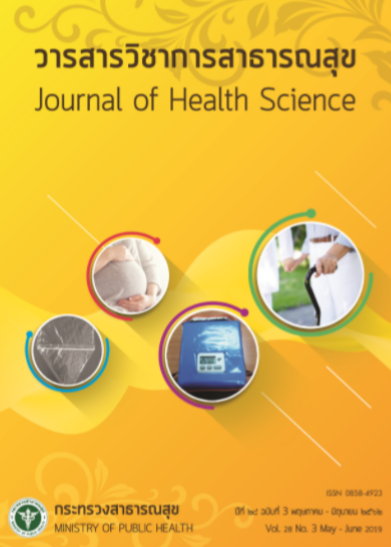The Use of Motor Response (M Score) to Predict the Prognosis and Improve Treatment Outcomes in Patients with Severe Traumatic Brain Injury, Pranangklao Hospital, Nonthaburi Province
Keywords:
severe traumatic brain injury, Glasgow coma scale, Glasgow outcome scale, motor responseAbstract
This study aimed to use motor response of Glasgow Coma Scale (M score) for outcome prediction in patients with severe traumatic brain injury (TBI) in order to provide proper management leading to the better treatment outcomes. The scope of the study also included the role of intensive care unit (ICU) on the patients’ survival. It was conducted as retrospective study among 214 severe TBI patients admitted at Pranangklao Hospital between October 2015 and September 2018. All patients had severe traumatic brain injury (GCS score 3-8 and M score of 1-5). Patients with moderate and mild TBI (M-score 6, GCS scores 9-12 and 13-15), multiple injuries with unstable hemodynamic (hypovolemic shock), spinal injury with paralytic extremities, or multiple fractures of extremities were excluded. The patients were divided into 2 groups: the M1- M3 group and the M4-M5 group. Both groups were admitted either in ICU or non-ICU depending on ICU beds status at admission time. It was found that the M1-M3 group had higher mortality than the M4-M5, (mortality rate of 88.1% vs. 26.9%). It was also revealed that ICU played an important role in reducing the mortality rate in both groups (ICU mortality of 81.0% vs. non-ICU mortality 95.2% in the M1-M3 group, and 11.9%, vs. 42.9 % in M4-M5, respectively, p<0.01). Thus, motor response (M score) should be used effectively for outcome prediction and selection of TBI patients with poor prognosis for intensive care; and ICU service could be necessary for the better survival. Patient with severe TBI, especially those with M score 4-5, should be admitted in ICU for better survival and better treatment outcomes. In conclusion, increasing the number of ICU beds to meet the patients need and selecting patients according to prognosis by using M score especially M4-M5 for ICU admission and proper management in case of limited ICU beds would decrease preventable deaths.
Downloads
Downloads
Published
How to Cite
Issue
Section
License
Copyright (c) 2019 Journal of Health Science - วารสารวิชาการสาธารณสุข

This work is licensed under a Creative Commons Attribution-NonCommercial-NoDerivatives 4.0 International License.







